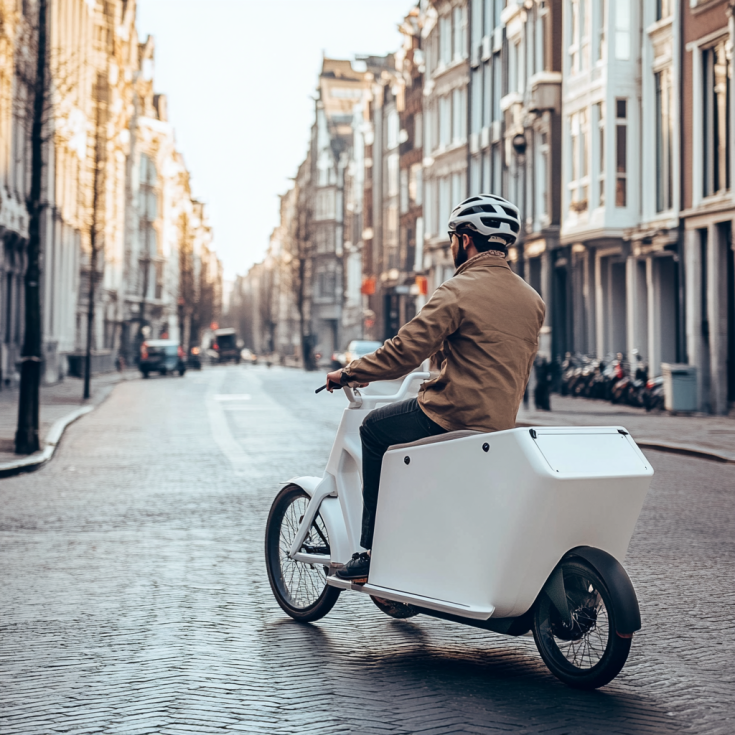Reducing the impact of urban logistics

Logistics – the distribution and storage of goods and materials – have a significant impact on our cities. They encompass everything from parcel delivery, to supply of retail stores, waste collection, and the distribution of food and ingredients to the HoReCa (Hotels, Restaurants, Catering) sector.
These services contribute to congestion but also take up significant space for parking and unloading, which can be disruptive to residents and businesses. Additionally, most of these logistics make use of polluting vehicles, producing carbon emissions and air pollutants.
In recent years, the impact has increased from the rise of e-commerce, as well as the growth of urban populations. For example, parcel deliveries increased by an average of 6.4% per year between 2013 and 2017, and by 14.6% per year, between 2017 and 2021, reflecting the impact of the COVID-19 pandemic.
To tackle these challenges, innovative technologies and strategies are being implemented to reduce congestion and lower emissions. Several Interreg Europe projects have explored low-carbon logistics, including RESOLVE (2016-2021), and the ongoing SPOTLOG and ZCI projects, revealing several trends in urban logistics.
Policy trends for low-carbon logistics
Firstly, with cities becoming aware of the impact of logistics, many are collecting data and devising strategies to reduce emissions and congestion. This requires establishing stakeholder panels and implementing citizen engagement methods. In some cases, it also involves public-private partnerships with logistics and delivery companies to implement collaborative projects. For example, in Lille (France) the municipality has entered into a partnership with La Poste to discuss projects and find solutions to logistics challenges.
A major trend is that of urban consolidation centres, where goods can be aggregated and sorted to reduce the number of delivery vehicles that head into the city centre. Examples include CityPorto in Padova (Italy) and City Hub in Roermond (Netherlands). Cities are also developing parcel lockers and collection points, aiming to reduce the number of failed deliveries and increase convenience for recipients. One such example is that of automated parcel machines (APMs) in Poland, which have reduced carbon emissions by 97% compared to last-mile delivery by vehicle.
Cities are also encouraging the shift to low-carbon delivery options, such as electric vehicles and cargo bikes. The district of Grafschaft Bentheim (Germany) has increased the number of cargo bikes making last mile deliveries by providing subsidies to businesses for purchasing them.
Accompanying this, in many cities, only specific types of vehicles can enter city centres thanks to low-emissions and pedestrian zoning which require the use of e-vehicles or bikes for goods delivery. Otherwise, access may only be possible at certain times of day, to limit congestion. In Emilia-Romagna, for example, Limited Traffic Zones (LTZs) have been established, which only electric delivery vehicles may access.
Improved logistics from RESOLVE
As a result of the RESOLVE project, which examined the impact of the retail sector, several partners were able to improve their regional policies and implement new actions focusing on sustainable urban logistics.
Manchester (United Kingdom) integrated lessons from RESOLVE into its Streets for All Strategy and accompanying Design Guide. This strategy has been formally adopted by all ten local authorities in Greater Manchester, meaning that all will follow the guidelines in their transport and urban policy.
Under the strategy, actions to limit the impact of deliveries on local communities will be implemented, including:
- Definition of freight routes
- Consolidation of goods for delivery
- Promotion of low-carbon vehicles
- Encouragement of deliveries at off-peak times
- Definition of sustainable delivery and servicing plans with large businesses and retailers
Learning from Reggio-Emilia (Italy), Maribor City Council introduced new rules to limit motorised delivery of goods to shops, businesses and restaurants in the city centre, allowing only e-vehicles to enter the pedestrian zone. The ordinance was introduced after consultation with businesses and citizens to reduce resistance to the changes.
Meanwhile, Kronoberg (Sweden) has used RESOLVE lessons to advance the ERDF-funded project, KOSAVA, which has implemented actions for reducing inner-city freight transports, and established the National Centre for Coordinated Merchandise Distribution to provide advice to Swedish municipalities.
Resources from the Policy Learning Platform
Building on the success of Interreg Europe projects and good practices, the Interreg Europe Policy Learning Platform has implemented several actions to bring lessons to other regions. These include:
- Policy brief on Sustainable Urban Logistics
- Webinars on urban freight and cargo bikes
- Peer review for the City of Warsaw on their urban logistics strategy
With the topic remaining high on the policy agenda, the Policy Learning Platform is preparing another webinar on reducing emissions in urban logistics, with presentations from SPOTLOG on a new set of indicators for sustainable logistics, as well as good practices from their partner regions, and from ZCI on their urban logistics masterclass.
Register now, and join us on 19 September for the webinar ‘Reducing the emissions of urban logistics’.